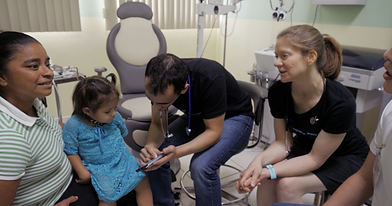
Human PapillomaVIRUS
JUVENILE recurrent respiratory papillomatosis
Juvenile Recurrent Respiratory Papillomatosis ("JRRP") is a condition that causes the growth of papillomas (wart-like growths) in the airway. Papillomas may be found in the throat, trachea (windpipe), or lungs, but usually on the larynx (voice box). Papillomas are usually benign (non-cancerous) but can vary in size and can grow very quickly. If not treated, the growth of the papillomas may make it difficult or impossible for a child to breathe. JRRP is caused by two types of Human Papilloma Virus ("HPV"), HPV 6 or HPV 11. Currently, there is no cure but JRRP can be managed with periodic surgical intervention, which is necessary since the papillomas often grow back quickly after they have been removed. Papillomas must be removed to prevent dangerous airway obstruction.
OURIMPACT
Diagnosis
JRRP is frequently diagnosed in children. When JRRP is suspected by symptoms, assessment is made either by viewing the voice box with a scope or by taking the child to the operating room to inspect the airway. The only way to absolutely confirm JRRP is with a biopsy.

Symptoms
Patients are often initially diagnosed with one or more of the following signs and symptoms:
-
Hoarseness
-
Noisy breathing
-
Difficulty speaking
-
Chronic cough
-
Abnormal cry
-
Loss of voice
-
Shortness of breath
It is critically important to recognize the symptoms of JRRP before potential life threatening obstruction develops from the papilloma.

Transmission of the Human Papillomaviras ("HPV") To children may be through exposure while traversing the birth canal of an infected mother
the most common presenting symptom of jrrp is hoarseness of the voice
treatment
The goal of treatment is to clear the airway of papillomas by a removal procedure, which may be performed using a potassium titanyl phosphate ("KTP") laser. Sometimes, specific medications are used, especially for children who require more than four surgical treatments a year. While the primary treatment is removal surgery, a Speech-language Pathologist can help the child by providing support and education about the effects of JRRP and surgeries removing papillomas from the vocal cords. Voice therapy is usually very helpful to teach a child techniques to manage these changes.
Prevention
There are two vaccines currently approved and available in the United States to prevent Human Papillomavirus ("HPV"), the virus that causes JRRP.
-
Gardasil®9 protects against HPV Types 6, 11, 16, and 18. Types 6 and 11 are most associated with genital warts and 16 and 18 with cervical cancer.
-
Cervarix® protects only against HPV Types 16 and 18.
Although Gardasil®9 does protect against HPV Types 6 and 11, the HPV Types associated with JRRP, the vaccine is only Food and Drug Administration ("FDA") approved for people 9 to 26 years of age. The current FDA recommendation is for both boys and girls to get vaccinated with the three required doses at age 11 or 12. Infants and young children can’t be protected directly, but may be if their mothers were vaccinated as children/young adults prior to HPV infection.
There are two vaccines currently approved and available in the United States to prevent Human Papillomavirus ("HPV"), the virus that causes JRRP.
-
Gardasil®9 protects against HPV Types 6, 11, 16, and 18. Types 6 and 11 are most associated with genital warts and 16 and 18 with cervical cancer.
-
Cervarix® protects only against HPV Types 16 and 18.
Although Gardasil®9 does protect against HPV Types 6 and 11, the HPV Types associated with JRRP, the vaccine is only Food and Drug Administration ("FDA") approved for people 9 to 26 years of age. The current FDA recommendation is for both boys and girls to get vaccinated with the three required doses at age 11 or 12. Infants and young children can’t be protected directly, but may be if their mothers were vaccinated as children/young adults prior to HPV infection.
current ongoing clinical research
We are actively engaged in a medical study of children with symptomatic JRRP. Our aim is to identify drug sensitivity and gain a better sense of a child’s immune state and how this may affect disease progression. For more information, please e-mail Dr. Christopher J. Hartnick, M.D. at:
christopher_hartnick@meei.harvard.edu
Learn more about other ongoing research initiatives involving JRRP

moving towards a cure
Thanks to The Benjamin Harry Peikin Foundation as well as government and private donors, pediatric ear, nose, and throat ("ENT") research at Mass Eye & Ear has resulted in significant breakthroughs and innovations that have advanced medical and surgical treatment. Together, we are making advancements in the treatment of newborns, children and adolescents with conditions or diseases impacting their airways as well as speech and voice issues.
Regarding Juvenile Recurrent Respiratory Papillomatosis ("JRRP"), by our medical study, we are exploring the immune-microenvironment of JRRP to evaluate possible immunotherapy treatments to slow the progression or ultimately cure the disease.
From a medical perspective, JRRP are HPV-related tumors with the potential to transform into a malignant (cancerous) stage. Previous research has found that dysregulation of immune cells, including enrichment of suppressive regulatory T cells and PD-L1 expression on tumor cells, may contribute to disease pathogenesis. However, the fundamental mechanism leading to this dysregulation remains unclear.
In collaboration with Dr. Christopher J. Hartnick, M.D., Dr. Tingyu Liu at Novartis Pharmaceuticals Corporation is leading research to understand the immune-microenvironment of JRRP. This collaboration aims to identify immune cell populations and mechanisms contributing to disease control. The research seeks therapeutic approaches to JRRP that improve anti-tumor immunity and control tumor growth.
If you have any questions about this research, please e-mail Dr. Christopher J. Hartnick, M.D. at:


